The Legal and Contractual Framework of the Oil and Glass Industry
VerifiedAdded on 2020/01/28
|9
|2641
|312
Report
AI Summary
This report delves into the legal aspects of the oil industry, primarily focusing on contractual relationships between host governments and international oil companies. It begins by highlighting the importance of oil as a crucial energy source and raw material, emphasizing the growth of the oil industry and the significance of contractual agreements in facilitating trade. The report explores the essential elements of a valid contract, including offer, acceptance, consideration, and agreement, and how these elements are applied in the context of oil import and export. A key focus is the concept of relative bargaining power, analyzing how it influences contract terms, especially in a market dominated by a few major oil producers. The report examines how factors such as oil quality and production capacity affect the bargaining dynamics between oil-producing countries and importing nations. It also discusses how the evolving landscape of oil production and the emergence of new producers impact the bargaining power of different parties. The conclusion summarizes the importance of oil in generating energy and the impact of the legal and contractual framework on international trade within the oil industry.
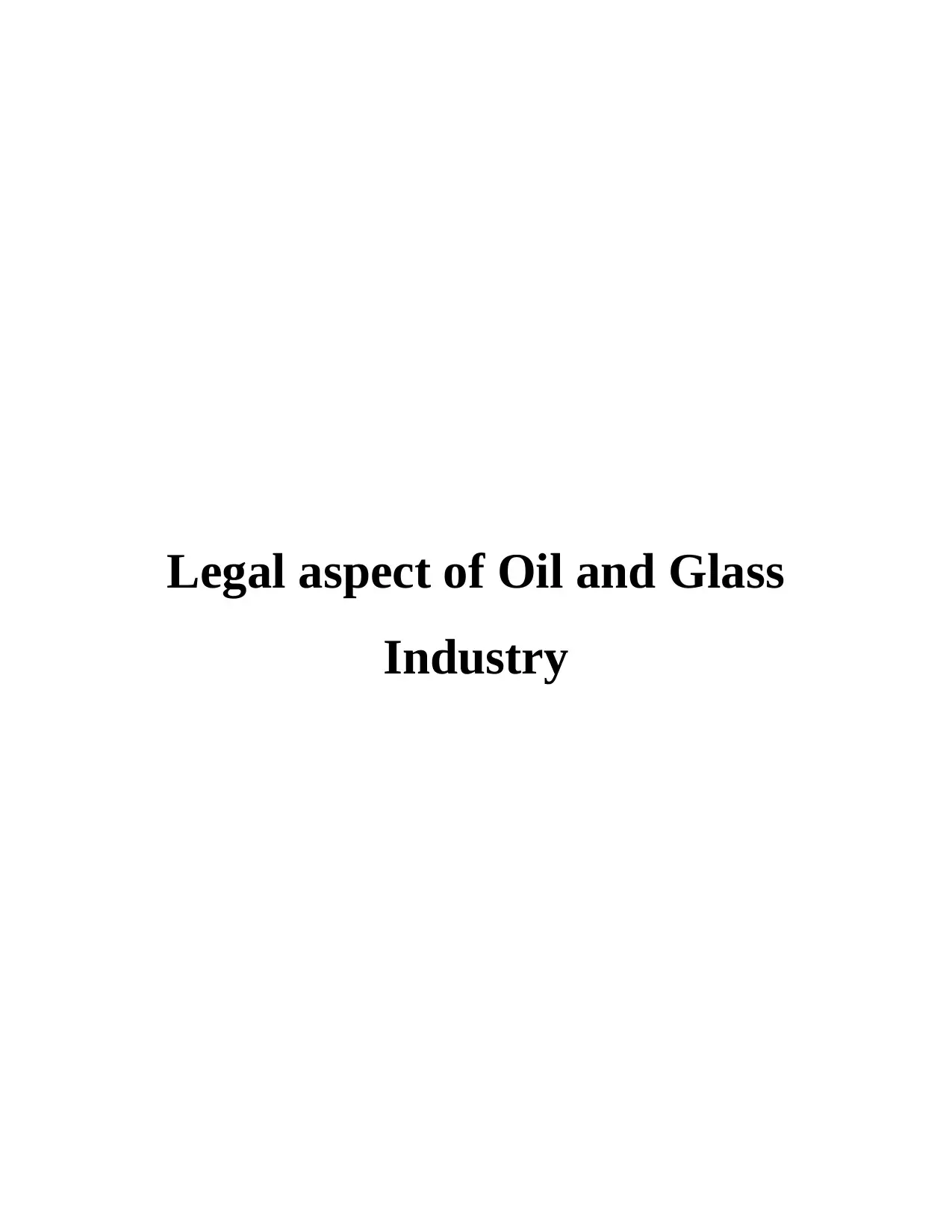
Legal aspect of Oil and Glass
Industry
Industry
Paraphrase This Document
Need a fresh take? Get an instant paraphrase of this document with our AI Paraphraser
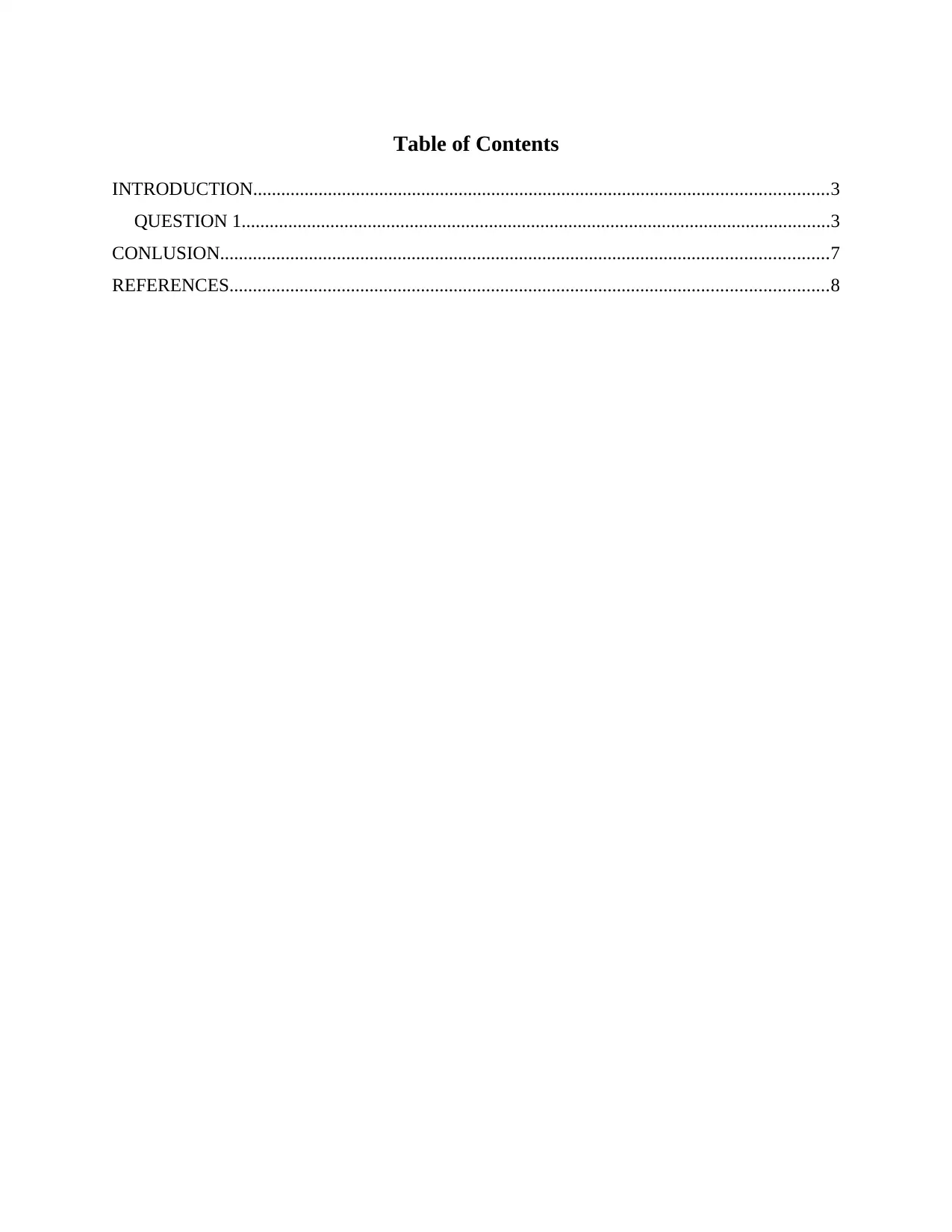
Table of Contents
INTRODUCTION...........................................................................................................................3
QUESTION 1..............................................................................................................................3
CONLUSION..................................................................................................................................7
REFERENCES................................................................................................................................8
INTRODUCTION...........................................................................................................................3
QUESTION 1..............................................................................................................................3
CONLUSION..................................................................................................................................7
REFERENCES................................................................................................................................8
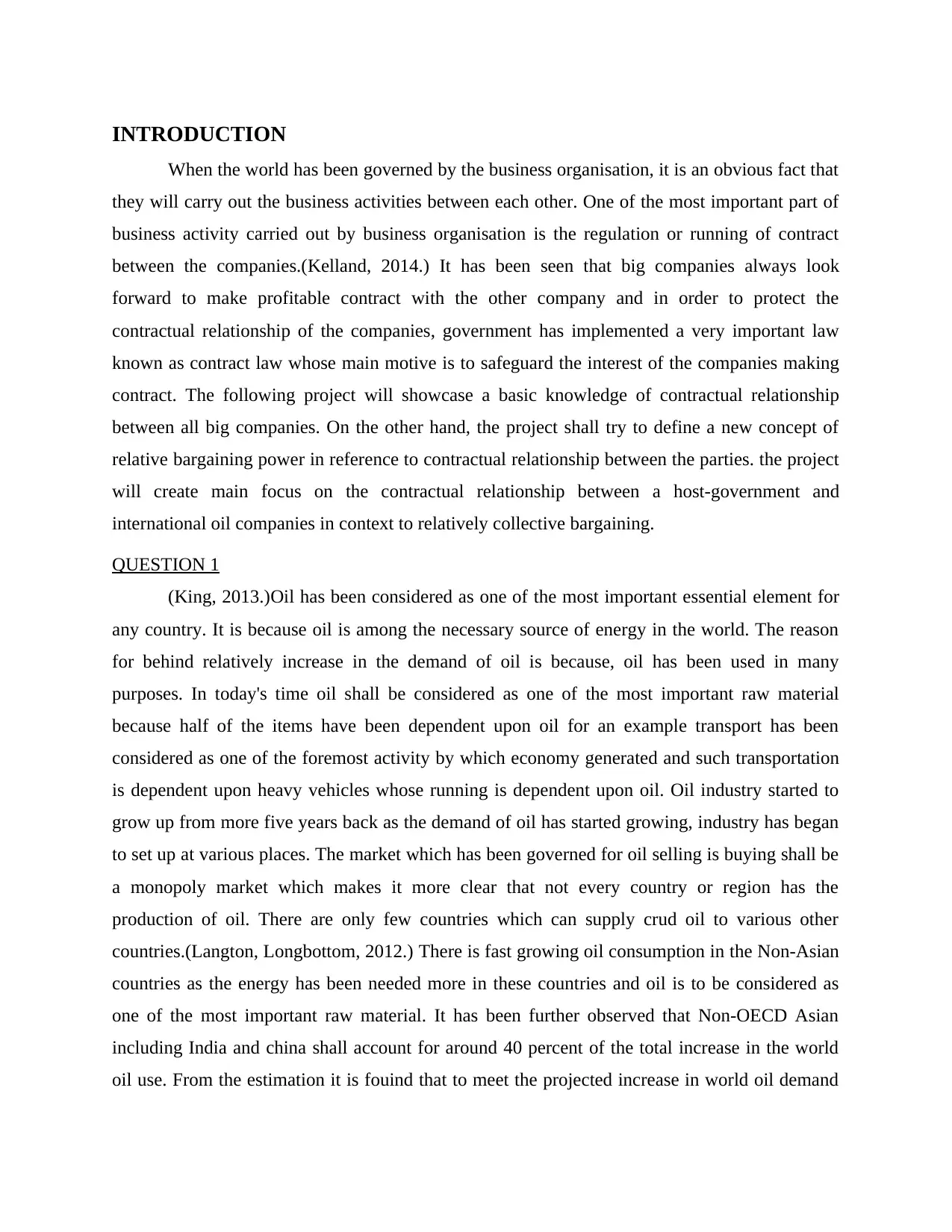
INTRODUCTION
When the world has been governed by the business organisation, it is an obvious fact that
they will carry out the business activities between each other. One of the most important part of
business activity carried out by business organisation is the regulation or running of contract
between the companies.(Kelland, 2014.) It has been seen that big companies always look
forward to make profitable contract with the other company and in order to protect the
contractual relationship of the companies, government has implemented a very important law
known as contract law whose main motive is to safeguard the interest of the companies making
contract. The following project will showcase a basic knowledge of contractual relationship
between all big companies. On the other hand, the project shall try to define a new concept of
relative bargaining power in reference to contractual relationship between the parties. the project
will create main focus on the contractual relationship between a host-government and
international oil companies in context to relatively collective bargaining.
QUESTION 1
(King, 2013.)Oil has been considered as one of the most important essential element for
any country. It is because oil is among the necessary source of energy in the world. The reason
for behind relatively increase in the demand of oil is because, oil has been used in many
purposes. In today's time oil shall be considered as one of the most important raw material
because half of the items have been dependent upon oil for an example transport has been
considered as one of the foremost activity by which economy generated and such transportation
is dependent upon heavy vehicles whose running is dependent upon oil. Oil industry started to
grow up from more five years back as the demand of oil has started growing, industry has began
to set up at various places. The market which has been governed for oil selling is buying shall be
a monopoly market which makes it more clear that not every country or region has the
production of oil. There are only few countries which can supply crud oil to various other
countries.(Langton, Longbottom, 2012.) There is fast growing oil consumption in the Non-Asian
countries as the energy has been needed more in these countries and oil is to be considered as
one of the most important raw material. It has been further observed that Non-OECD Asian
including India and china shall account for around 40 percent of the total increase in the world
oil use. From the estimation it is fouind that to meet the projected increase in world oil demand
When the world has been governed by the business organisation, it is an obvious fact that
they will carry out the business activities between each other. One of the most important part of
business activity carried out by business organisation is the regulation or running of contract
between the companies.(Kelland, 2014.) It has been seen that big companies always look
forward to make profitable contract with the other company and in order to protect the
contractual relationship of the companies, government has implemented a very important law
known as contract law whose main motive is to safeguard the interest of the companies making
contract. The following project will showcase a basic knowledge of contractual relationship
between all big companies. On the other hand, the project shall try to define a new concept of
relative bargaining power in reference to contractual relationship between the parties. the project
will create main focus on the contractual relationship between a host-government and
international oil companies in context to relatively collective bargaining.
QUESTION 1
(King, 2013.)Oil has been considered as one of the most important essential element for
any country. It is because oil is among the necessary source of energy in the world. The reason
for behind relatively increase in the demand of oil is because, oil has been used in many
purposes. In today's time oil shall be considered as one of the most important raw material
because half of the items have been dependent upon oil for an example transport has been
considered as one of the foremost activity by which economy generated and such transportation
is dependent upon heavy vehicles whose running is dependent upon oil. Oil industry started to
grow up from more five years back as the demand of oil has started growing, industry has began
to set up at various places. The market which has been governed for oil selling is buying shall be
a monopoly market which makes it more clear that not every country or region has the
production of oil. There are only few countries which can supply crud oil to various other
countries.(Langton, Longbottom, 2012.) There is fast growing oil consumption in the Non-Asian
countries as the energy has been needed more in these countries and oil is to be considered as
one of the most important raw material. It has been further observed that Non-OECD Asian
including India and china shall account for around 40 percent of the total increase in the world
oil use. From the estimation it is fouind that to meet the projected increase in world oil demand
⊘ This is a preview!⊘
Do you want full access?
Subscribe today to unlock all pages.

Trusted by 1+ million students worldwide
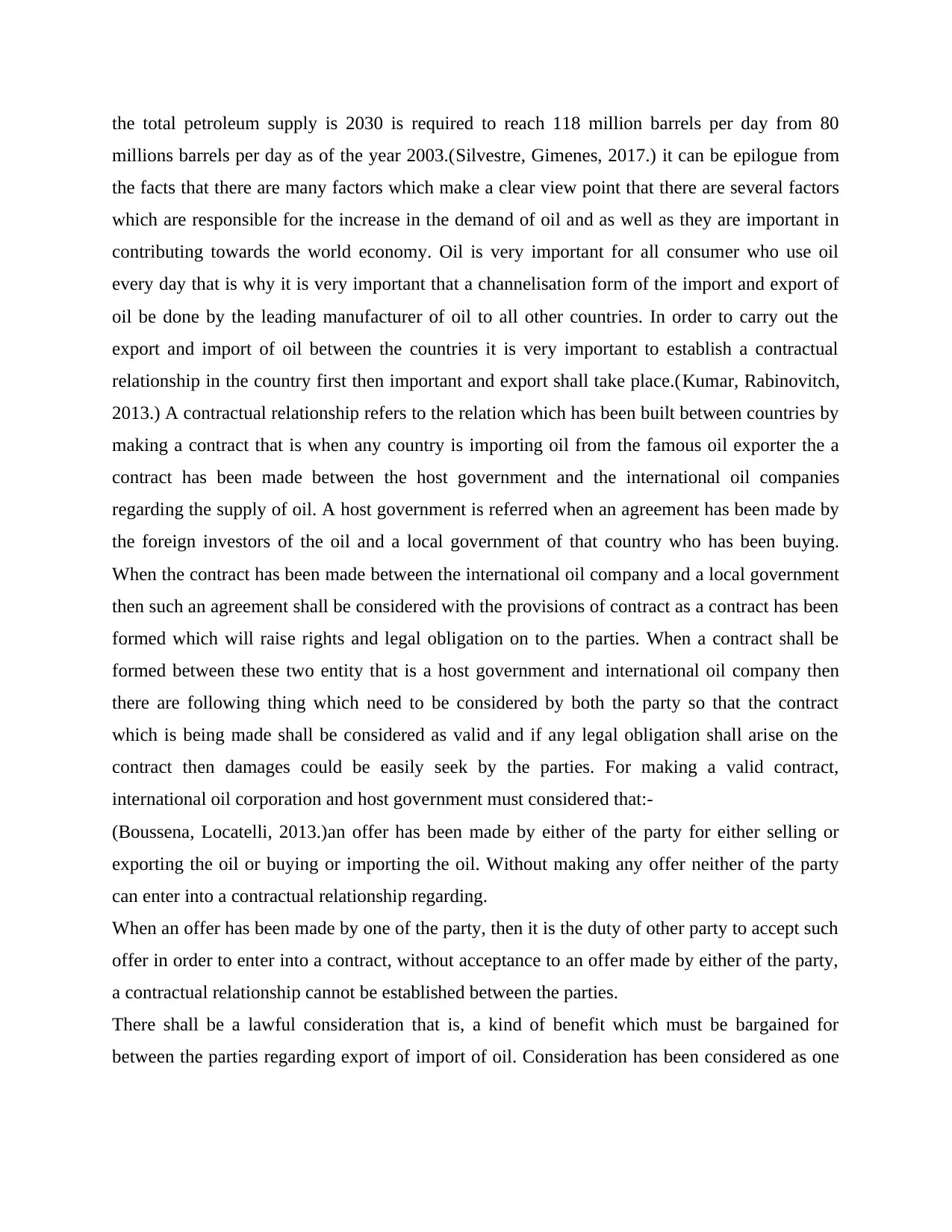
the total petroleum supply is 2030 is required to reach 118 million barrels per day from 80
millions barrels per day as of the year 2003.(Silvestre, Gimenes, 2017.) it can be epilogue from
the facts that there are many factors which make a clear view point that there are several factors
which are responsible for the increase in the demand of oil and as well as they are important in
contributing towards the world economy. Oil is very important for all consumer who use oil
every day that is why it is very important that a channelisation form of the import and export of
oil be done by the leading manufacturer of oil to all other countries. In order to carry out the
export and import of oil between the countries it is very important to establish a contractual
relationship in the country first then important and export shall take place.(Kumar, Rabinovitch,
2013.) A contractual relationship refers to the relation which has been built between countries by
making a contract that is when any country is importing oil from the famous oil exporter the a
contract has been made between the host government and the international oil companies
regarding the supply of oil. A host government is referred when an agreement has been made by
the foreign investors of the oil and a local government of that country who has been buying.
When the contract has been made between the international oil company and a local government
then such an agreement shall be considered with the provisions of contract as a contract has been
formed which will raise rights and legal obligation on to the parties. When a contract shall be
formed between these two entity that is a host government and international oil company then
there are following thing which need to be considered by both the party so that the contract
which is being made shall be considered as valid and if any legal obligation shall arise on the
contract then damages could be easily seek by the parties. For making a valid contract,
international oil corporation and host government must considered that:-
(Boussena, Locatelli, 2013.)an offer has been made by either of the party for either selling or
exporting the oil or buying or importing the oil. Without making any offer neither of the party
can enter into a contractual relationship regarding.
When an offer has been made by one of the party, then it is the duty of other party to accept such
offer in order to enter into a contract, without acceptance to an offer made by either of the party,
a contractual relationship cannot be established between the parties.
There shall be a lawful consideration that is, a kind of benefit which must be bargained for
between the parties regarding export of import of oil. Consideration has been considered as one
millions barrels per day as of the year 2003.(Silvestre, Gimenes, 2017.) it can be epilogue from
the facts that there are many factors which make a clear view point that there are several factors
which are responsible for the increase in the demand of oil and as well as they are important in
contributing towards the world economy. Oil is very important for all consumer who use oil
every day that is why it is very important that a channelisation form of the import and export of
oil be done by the leading manufacturer of oil to all other countries. In order to carry out the
export and import of oil between the countries it is very important to establish a contractual
relationship in the country first then important and export shall take place.(Kumar, Rabinovitch,
2013.) A contractual relationship refers to the relation which has been built between countries by
making a contract that is when any country is importing oil from the famous oil exporter the a
contract has been made between the host government and the international oil companies
regarding the supply of oil. A host government is referred when an agreement has been made by
the foreign investors of the oil and a local government of that country who has been buying.
When the contract has been made between the international oil company and a local government
then such an agreement shall be considered with the provisions of contract as a contract has been
formed which will raise rights and legal obligation on to the parties. When a contract shall be
formed between these two entity that is a host government and international oil company then
there are following thing which need to be considered by both the party so that the contract
which is being made shall be considered as valid and if any legal obligation shall arise on the
contract then damages could be easily seek by the parties. For making a valid contract,
international oil corporation and host government must considered that:-
(Boussena, Locatelli, 2013.)an offer has been made by either of the party for either selling or
exporting the oil or buying or importing the oil. Without making any offer neither of the party
can enter into a contractual relationship regarding.
When an offer has been made by one of the party, then it is the duty of other party to accept such
offer in order to enter into a contract, without acceptance to an offer made by either of the party,
a contractual relationship cannot be established between the parties.
There shall be a lawful consideration that is, a kind of benefit which must be bargained for
between the parties regarding export of import of oil. Consideration has been considered as one
Paraphrase This Document
Need a fresh take? Get an instant paraphrase of this document with our AI Paraphraser
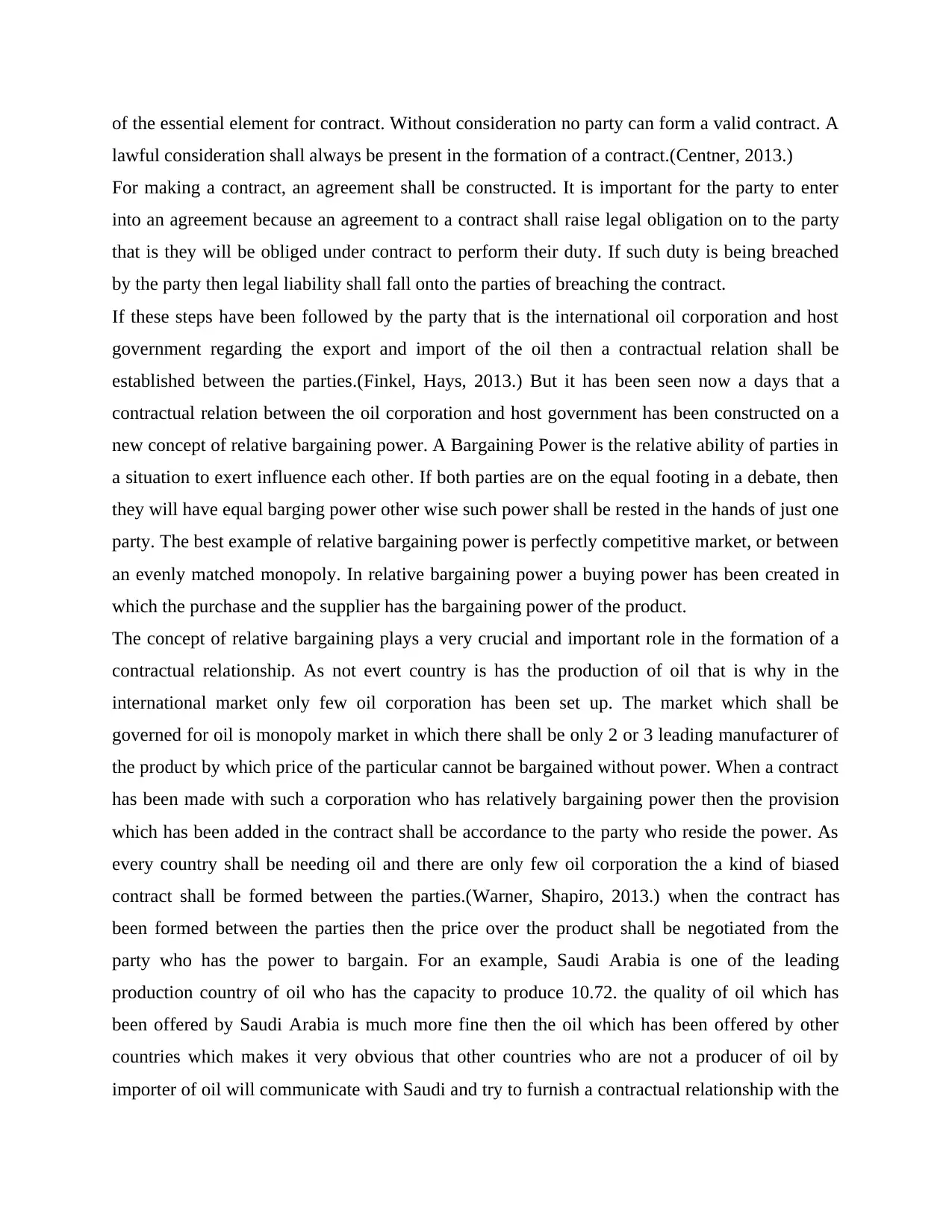
of the essential element for contract. Without consideration no party can form a valid contract. A
lawful consideration shall always be present in the formation of a contract.(Centner, 2013.)
For making a contract, an agreement shall be constructed. It is important for the party to enter
into an agreement because an agreement to a contract shall raise legal obligation on to the party
that is they will be obliged under contract to perform their duty. If such duty is being breached
by the party then legal liability shall fall onto the parties of breaching the contract.
If these steps have been followed by the party that is the international oil corporation and host
government regarding the export and import of the oil then a contractual relation shall be
established between the parties.(Finkel, Hays, 2013.) But it has been seen now a days that a
contractual relation between the oil corporation and host government has been constructed on a
new concept of relative bargaining power. A Bargaining Power is the relative ability of parties in
a situation to exert influence each other. If both parties are on the equal footing in a debate, then
they will have equal barging power other wise such power shall be rested in the hands of just one
party. The best example of relative bargaining power is perfectly competitive market, or between
an evenly matched monopoly. In relative bargaining power a buying power has been created in
which the purchase and the supplier has the bargaining power of the product.
The concept of relative bargaining plays a very crucial and important role in the formation of a
contractual relationship. As not evert country is has the production of oil that is why in the
international market only few oil corporation has been set up. The market which shall be
governed for oil is monopoly market in which there shall be only 2 or 3 leading manufacturer of
the product by which price of the particular cannot be bargained without power. When a contract
has been made with such a corporation who has relatively bargaining power then the provision
which has been added in the contract shall be accordance to the party who reside the power. As
every country shall be needing oil and there are only few oil corporation the a kind of biased
contract shall be formed between the parties.(Warner, Shapiro, 2013.) when the contract has
been formed between the parties then the price over the product shall be negotiated from the
party who has the power to bargain. For an example, Saudi Arabia is one of the leading
production country of oil who has the capacity to produce 10.72. the quality of oil which has
been offered by Saudi Arabia is much more fine then the oil which has been offered by other
countries which makes it very obvious that other countries who are not a producer of oil by
importer of oil will communicate with Saudi and try to furnish a contractual relationship with the
lawful consideration shall always be present in the formation of a contract.(Centner, 2013.)
For making a contract, an agreement shall be constructed. It is important for the party to enter
into an agreement because an agreement to a contract shall raise legal obligation on to the party
that is they will be obliged under contract to perform their duty. If such duty is being breached
by the party then legal liability shall fall onto the parties of breaching the contract.
If these steps have been followed by the party that is the international oil corporation and host
government regarding the export and import of the oil then a contractual relation shall be
established between the parties.(Finkel, Hays, 2013.) But it has been seen now a days that a
contractual relation between the oil corporation and host government has been constructed on a
new concept of relative bargaining power. A Bargaining Power is the relative ability of parties in
a situation to exert influence each other. If both parties are on the equal footing in a debate, then
they will have equal barging power other wise such power shall be rested in the hands of just one
party. The best example of relative bargaining power is perfectly competitive market, or between
an evenly matched monopoly. In relative bargaining power a buying power has been created in
which the purchase and the supplier has the bargaining power of the product.
The concept of relative bargaining plays a very crucial and important role in the formation of a
contractual relationship. As not evert country is has the production of oil that is why in the
international market only few oil corporation has been set up. The market which shall be
governed for oil is monopoly market in which there shall be only 2 or 3 leading manufacturer of
the product by which price of the particular cannot be bargained without power. When a contract
has been made with such a corporation who has relatively bargaining power then the provision
which has been added in the contract shall be accordance to the party who reside the power. As
every country shall be needing oil and there are only few oil corporation the a kind of biased
contract shall be formed between the parties.(Warner, Shapiro, 2013.) when the contract has
been formed between the parties then the price over the product shall be negotiated from the
party who has the power to bargain. For an example, Saudi Arabia is one of the leading
production country of oil who has the capacity to produce 10.72. the quality of oil which has
been offered by Saudi Arabia is much more fine then the oil which has been offered by other
countries which makes it very obvious that other countries who are not a producer of oil by
importer of oil will communicate with Saudi and try to furnish a contractual relationship with the
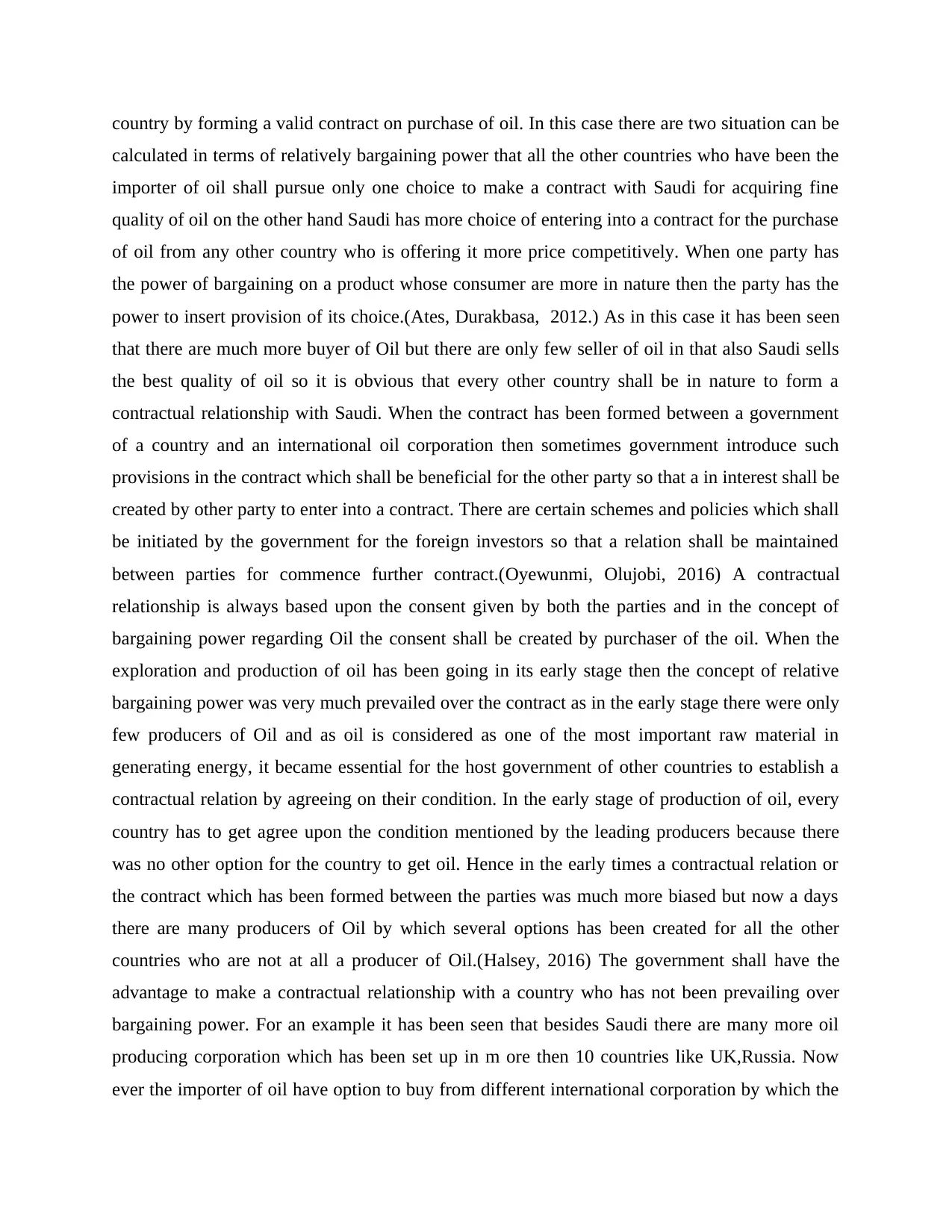
country by forming a valid contract on purchase of oil. In this case there are two situation can be
calculated in terms of relatively bargaining power that all the other countries who have been the
importer of oil shall pursue only one choice to make a contract with Saudi for acquiring fine
quality of oil on the other hand Saudi has more choice of entering into a contract for the purchase
of oil from any other country who is offering it more price competitively. When one party has
the power of bargaining on a product whose consumer are more in nature then the party has the
power to insert provision of its choice.(Ates, Durakbasa, 2012.) As in this case it has been seen
that there are much more buyer of Oil but there are only few seller of oil in that also Saudi sells
the best quality of oil so it is obvious that every other country shall be in nature to form a
contractual relationship with Saudi. When the contract has been formed between a government
of a country and an international oil corporation then sometimes government introduce such
provisions in the contract which shall be beneficial for the other party so that a in interest shall be
created by other party to enter into a contract. There are certain schemes and policies which shall
be initiated by the government for the foreign investors so that a relation shall be maintained
between parties for commence further contract.(Oyewunmi, Olujobi, 2016) A contractual
relationship is always based upon the consent given by both the parties and in the concept of
bargaining power regarding Oil the consent shall be created by purchaser of the oil. When the
exploration and production of oil has been going in its early stage then the concept of relative
bargaining power was very much prevailed over the contract as in the early stage there were only
few producers of Oil and as oil is considered as one of the most important raw material in
generating energy, it became essential for the host government of other countries to establish a
contractual relation by agreeing on their condition. In the early stage of production of oil, every
country has to get agree upon the condition mentioned by the leading producers because there
was no other option for the country to get oil. Hence in the early times a contractual relation or
the contract which has been formed between the parties was much more biased but now a days
there are many producers of Oil by which several options has been created for all the other
countries who are not at all a producer of Oil.(Halsey, 2016) The government shall have the
advantage to make a contractual relationship with a country who has not been prevailing over
bargaining power. For an example it has been seen that besides Saudi there are many more oil
producing corporation which has been set up in m ore then 10 countries like UK,Russia. Now
ever the importer of oil have option to buy from different international corporation by which the
calculated in terms of relatively bargaining power that all the other countries who have been the
importer of oil shall pursue only one choice to make a contract with Saudi for acquiring fine
quality of oil on the other hand Saudi has more choice of entering into a contract for the purchase
of oil from any other country who is offering it more price competitively. When one party has
the power of bargaining on a product whose consumer are more in nature then the party has the
power to insert provision of its choice.(Ates, Durakbasa, 2012.) As in this case it has been seen
that there are much more buyer of Oil but there are only few seller of oil in that also Saudi sells
the best quality of oil so it is obvious that every other country shall be in nature to form a
contractual relationship with Saudi. When the contract has been formed between a government
of a country and an international oil corporation then sometimes government introduce such
provisions in the contract which shall be beneficial for the other party so that a in interest shall be
created by other party to enter into a contract. There are certain schemes and policies which shall
be initiated by the government for the foreign investors so that a relation shall be maintained
between parties for commence further contract.(Oyewunmi, Olujobi, 2016) A contractual
relationship is always based upon the consent given by both the parties and in the concept of
bargaining power regarding Oil the consent shall be created by purchaser of the oil. When the
exploration and production of oil has been going in its early stage then the concept of relative
bargaining power was very much prevailed over the contract as in the early stage there were only
few producers of Oil and as oil is considered as one of the most important raw material in
generating energy, it became essential for the host government of other countries to establish a
contractual relation by agreeing on their condition. In the early stage of production of oil, every
country has to get agree upon the condition mentioned by the leading producers because there
was no other option for the country to get oil. Hence in the early times a contractual relation or
the contract which has been formed between the parties was much more biased but now a days
there are many producers of Oil by which several options has been created for all the other
countries who are not at all a producer of Oil.(Halsey, 2016) The government shall have the
advantage to make a contractual relationship with a country who has not been prevailing over
bargaining power. For an example it has been seen that besides Saudi there are many more oil
producing corporation which has been set up in m ore then 10 countries like UK,Russia. Now
ever the importer of oil have option to buy from different international corporation by which the
⊘ This is a preview!⊘
Do you want full access?
Subscribe today to unlock all pages.

Trusted by 1+ million students worldwide
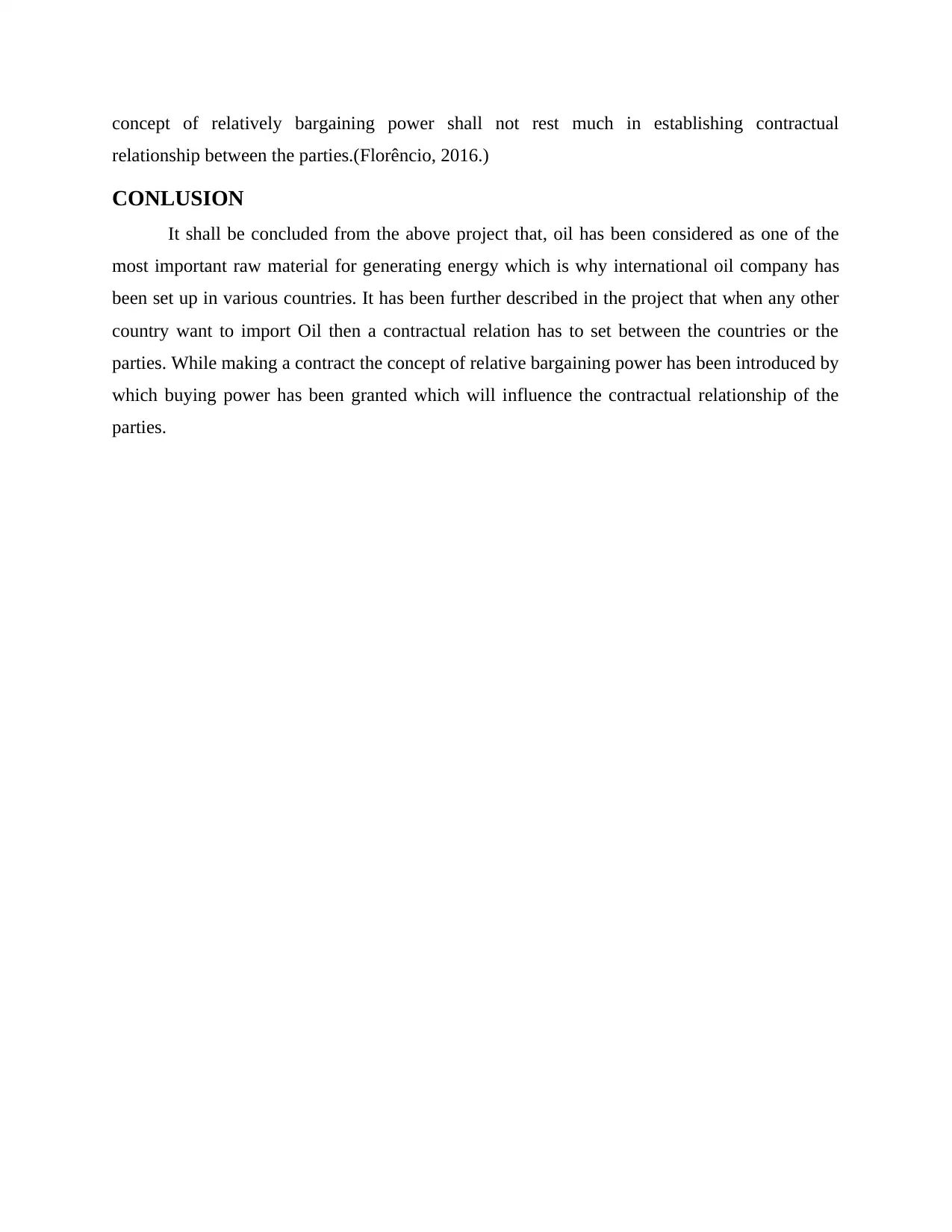
concept of relatively bargaining power shall not rest much in establishing contractual
relationship between the parties.(Florêncio, 2016.)
CONLUSION
It shall be concluded from the above project that, oil has been considered as one of the
most important raw material for generating energy which is why international oil company has
been set up in various countries. It has been further described in the project that when any other
country want to import Oil then a contractual relation has to set between the countries or the
parties. While making a contract the concept of relative bargaining power has been introduced by
which buying power has been granted which will influence the contractual relationship of the
parties.
relationship between the parties.(Florêncio, 2016.)
CONLUSION
It shall be concluded from the above project that, oil has been considered as one of the
most important raw material for generating energy which is why international oil company has
been set up in various countries. It has been further described in the project that when any other
country want to import Oil then a contractual relation has to set between the countries or the
parties. While making a contract the concept of relative bargaining power has been introduced by
which buying power has been granted which will influence the contractual relationship of the
parties.
Paraphrase This Document
Need a fresh take? Get an instant paraphrase of this document with our AI Paraphraser
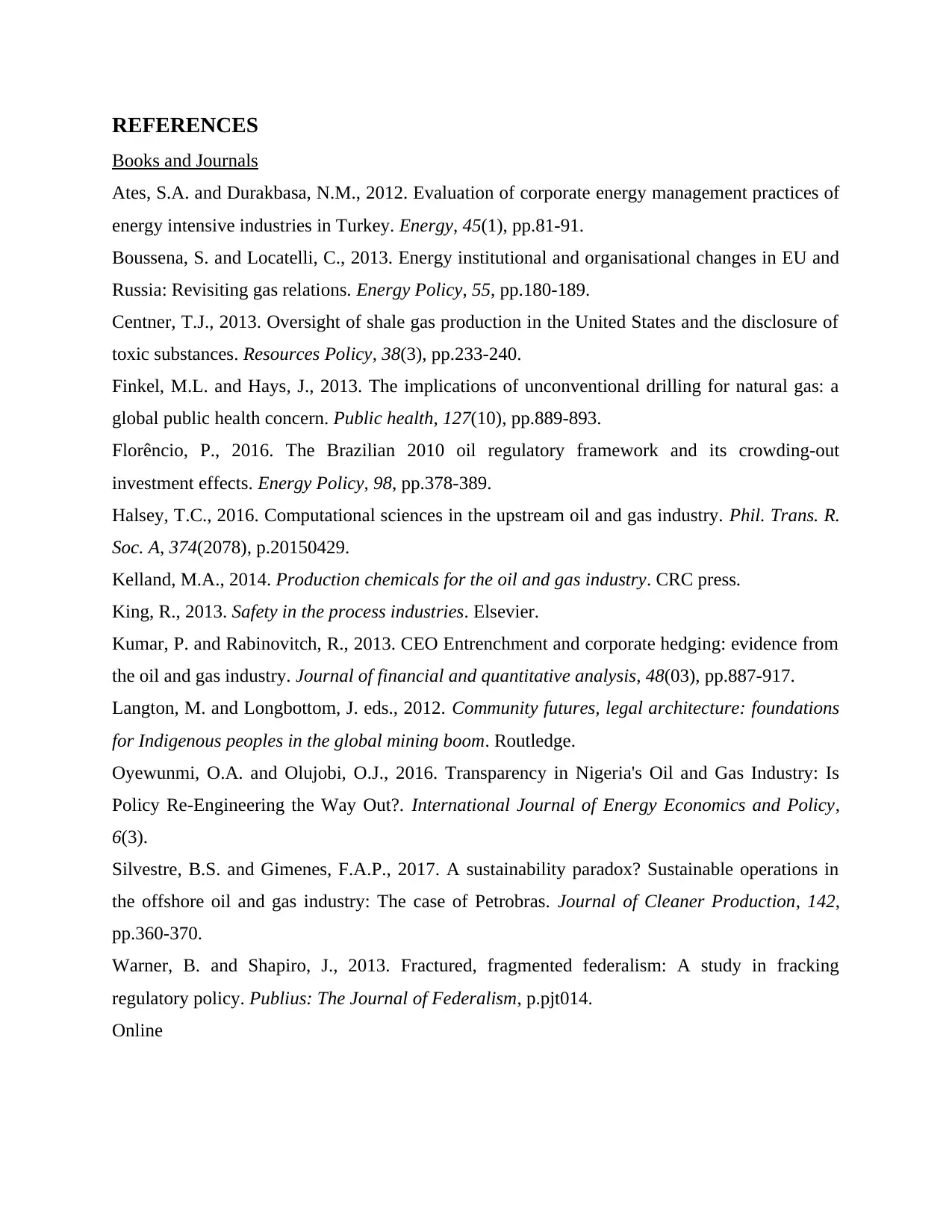
REFERENCES
Books and Journals
Ates, S.A. and Durakbasa, N.M., 2012. Evaluation of corporate energy management practices of
energy intensive industries in Turkey. Energy, 45(1), pp.81-91.
Boussena, S. and Locatelli, C., 2013. Energy institutional and organisational changes in EU and
Russia: Revisiting gas relations. Energy Policy, 55, pp.180-189.
Centner, T.J., 2013. Oversight of shale gas production in the United States and the disclosure of
toxic substances. Resources Policy, 38(3), pp.233-240.
Finkel, M.L. and Hays, J., 2013. The implications of unconventional drilling for natural gas: a
global public health concern. Public health, 127(10), pp.889-893.
Florêncio, P., 2016. The Brazilian 2010 oil regulatory framework and its crowding-out
investment effects. Energy Policy, 98, pp.378-389.
Halsey, T.C., 2016. Computational sciences in the upstream oil and gas industry. Phil. Trans. R.
Soc. A, 374(2078), p.20150429.
Kelland, M.A., 2014. Production chemicals for the oil and gas industry. CRC press.
King, R., 2013. Safety in the process industries. Elsevier.
Kumar, P. and Rabinovitch, R., 2013. CEO Entrenchment and corporate hedging: evidence from
the oil and gas industry. Journal of financial and quantitative analysis, 48(03), pp.887-917.
Langton, M. and Longbottom, J. eds., 2012. Community futures, legal architecture: foundations
for Indigenous peoples in the global mining boom. Routledge.
Oyewunmi, O.A. and Olujobi, O.J., 2016. Transparency in Nigeria's Oil and Gas Industry: Is
Policy Re-Engineering the Way Out?. International Journal of Energy Economics and Policy,
6(3).
Silvestre, B.S. and Gimenes, F.A.P., 2017. A sustainability paradox? Sustainable operations in
the offshore oil and gas industry: The case of Petrobras. Journal of Cleaner Production, 142,
pp.360-370.
Warner, B. and Shapiro, J., 2013. Fractured, fragmented federalism: A study in fracking
regulatory policy. Publius: The Journal of Federalism, p.pjt014.
Online
Books and Journals
Ates, S.A. and Durakbasa, N.M., 2012. Evaluation of corporate energy management practices of
energy intensive industries in Turkey. Energy, 45(1), pp.81-91.
Boussena, S. and Locatelli, C., 2013. Energy institutional and organisational changes in EU and
Russia: Revisiting gas relations. Energy Policy, 55, pp.180-189.
Centner, T.J., 2013. Oversight of shale gas production in the United States and the disclosure of
toxic substances. Resources Policy, 38(3), pp.233-240.
Finkel, M.L. and Hays, J., 2013. The implications of unconventional drilling for natural gas: a
global public health concern. Public health, 127(10), pp.889-893.
Florêncio, P., 2016. The Brazilian 2010 oil regulatory framework and its crowding-out
investment effects. Energy Policy, 98, pp.378-389.
Halsey, T.C., 2016. Computational sciences in the upstream oil and gas industry. Phil. Trans. R.
Soc. A, 374(2078), p.20150429.
Kelland, M.A., 2014. Production chemicals for the oil and gas industry. CRC press.
King, R., 2013. Safety in the process industries. Elsevier.
Kumar, P. and Rabinovitch, R., 2013. CEO Entrenchment and corporate hedging: evidence from
the oil and gas industry. Journal of financial and quantitative analysis, 48(03), pp.887-917.
Langton, M. and Longbottom, J. eds., 2012. Community futures, legal architecture: foundations
for Indigenous peoples in the global mining boom. Routledge.
Oyewunmi, O.A. and Olujobi, O.J., 2016. Transparency in Nigeria's Oil and Gas Industry: Is
Policy Re-Engineering the Way Out?. International Journal of Energy Economics and Policy,
6(3).
Silvestre, B.S. and Gimenes, F.A.P., 2017. A sustainability paradox? Sustainable operations in
the offshore oil and gas industry: The case of Petrobras. Journal of Cleaner Production, 142,
pp.360-370.
Warner, B. and Shapiro, J., 2013. Fractured, fragmented federalism: A study in fracking
regulatory policy. Publius: The Journal of Federalism, p.pjt014.
Online

LawTeacher. 2003-2016. [Online]. Available through. http://www.lawteacher.net/free-law-
essays/international-law/legal-aspects-of-oil-and-gas-contracts-international-law-essay.php.
Accessed on 5th December 2016.
essays/international-law/legal-aspects-of-oil-and-gas-contracts-international-law-essay.php.
Accessed on 5th December 2016.
⊘ This is a preview!⊘
Do you want full access?
Subscribe today to unlock all pages.

Trusted by 1+ million students worldwide
1 out of 9
Related Documents
Your All-in-One AI-Powered Toolkit for Academic Success.
+13062052269
info@desklib.com
Available 24*7 on WhatsApp / Email
![[object Object]](/_next/static/media/star-bottom.7253800d.svg)
Unlock your academic potential
Copyright © 2020–2025 A2Z Services. All Rights Reserved. Developed and managed by ZUCOL.




